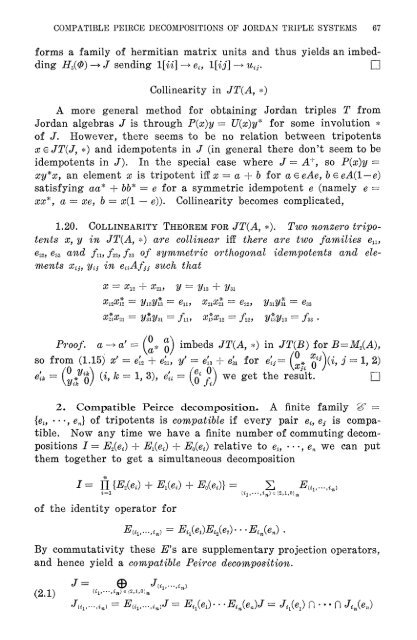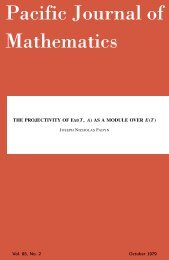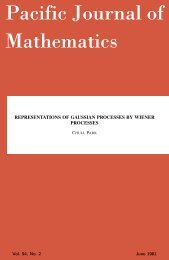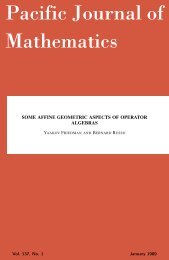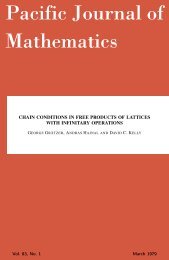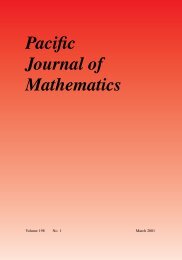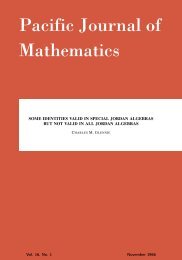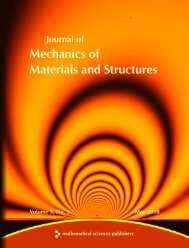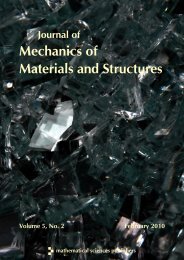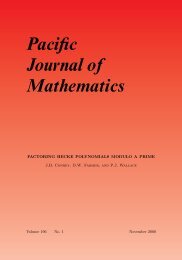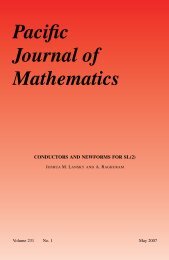Compatible Peirce decompositions of Jordan triple systems - MSP
Compatible Peirce decompositions of Jordan triple systems - MSP
Compatible Peirce decompositions of Jordan triple systems - MSP
Create successful ePaper yourself
Turn your PDF publications into a flip-book with our unique Google optimized e-Paper software.
COMPATIBLE PEIRCE DECOMPOSITIONS OF JORDAN TRIPLE SYSTEMS 67<br />
forms a family <strong>of</strong> hermitian matrix units and thus yields an imbedding<br />
H Z(Φ) —• / sending l[ii] -> e if l[ij] -> ι%. •<br />
Collinearity in JT(A, *)<br />
A more general method for obtaining <strong>Jordan</strong> <strong>triple</strong>s T from<br />
<strong>Jordan</strong> algebras J is through P(x)y — U(x)y* for some involution *<br />
<strong>of</strong> J. However, there seems to be no relation between tripotents<br />
x e JT(J, *) and idempotents in J (in general there don't seem to be<br />
idempotents in J). In the special case where / = A +<br />
, so P(x)y =<br />
xy*x, an element x is tripotent iff x — a + δ for aeeAe, beeA(l — e)<br />
satisfying αα* + 66* = e for a symmetric idempotent β (namely e =<br />
a%c*, a = xe, 6 = a;(l — e)). Collinearity becomes complicated,<br />
1.20. COLLINEARITY THEOREM FOR JT(A, *). Two nonzero tripotents<br />
x, y in JT(A, *) are collinear iff £/&erβ are £wo families e n,<br />
€22, β 33 a^cί / n, / 22, / 33 o/ symmetric orthogonal idempotents and elements<br />
x ijf y i3' in e uAf 5j such that<br />
x = x 12 + x 21, y = y 13 + y 31<br />
Pro<strong>of</strong>. a->a' = (\ Q) imbeds JΓ(A, *) in JΓ(B) for B=Λf 2(il),<br />
so from (1.15) ^' - eί 2 + e 21, y' = eί s + ώ for ej,.= ^ t °Q j<br />
\i, j = 1, 2)<br />
^4 = (°/Q) (i, fc = 1, 3), e'u = ^Q* ?) we get the result. Π<br />
2* <strong>Compatible</strong> <strong>Peirce</strong> decomposition* A finite family gf —<br />
{βi, , en } <strong>of</strong> tripotents is compatible if every pair eif e3- is compatible.<br />
Now any time we have a finite number <strong>of</strong> commuting <strong>decompositions</strong><br />
I — Eziβi) + E^βi) + E0 (ei) relative to eu them together to get a simultaneous decomposition<br />
, en we can put<br />
<strong>of</strong> the identity operator for<br />
Σ<br />
(i I , .i Λ )e{2,l,0} Λ<br />
By commutativity these JSΓS are supplementary projection operators,<br />
and hence yield a compatible <strong>Peirce</strong> decomposition.<br />
J — © ^ (ϊi, ,ί Λ )<br />
(2.1) « 1 . .i,)βu, 1 .θ!.


